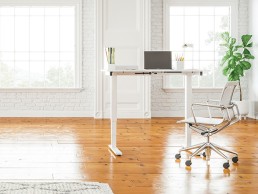
Designers Mind: Wellbeing becoming work’s partner
Continuing the discussion on employee wellbeing, Designers Mind Founder Kaye Preston explores the relationship between work and health, and how companies can provide more support to their staff.
The mental health and wellbeing of employees has never been more important. As we navigate what comes next we have a real opportunity to explore how we can optimise our physical and mental health so we can improve how we’re working.
Understanding the relationship between our health and work is paramount, as is creating a culture within organisations where employees feel their mental health and wellbeing are supported.
Wellbeing and our work
We all know our health is important, however too often it gets slotted in around a long workday, family commitments, our partners, even life admin.
Work is important, no question about it. It not only provides us with financial security but can also create purpose, connection, collaboration, creativity and confidence. Unfortunately, we often prioritise work over other areas of our lives and many times way above our wellbeing. Who hasn’t grabbed something unhealthy to eat to save time and meet a deadline, or answered emails late into the night forgoing both down time and good quality sleep? These behaviours become the norm, sacrificing our physical and mental health in the long run.
But what if I told you that improving your health can improve your work? Let’s sit with that thought for a moment.
Be honest, would this be a mindset shift or, as I imagine for many, you know this is true but still don’t make your wellbeing a top priority?
Prioritising our health can lead to improved performance, productivity, more energy, better focus, resilience and impacts our overall happiness. We could have more creativity for our projects, be better able to make crucial decisions and have more confidence in ourselves and our abilities.
I recently came across this quote that really made me think about the concept of our health and work supporting one another: “Rest is not work’s opposite, rest is work’s partner” – Alex Pang, Author and former Tech Consultant.
Could we go one step further with this and say “Wellbeing is work’s partner”?
What about organisations’ role?
I often talk about prioritising our wellbeing as a two-way street. Employees need to take responsibility for their own health and be accountable for their actions. Only they can create healthy habits and make lifestyle changes to support their own health. However, organisations need to create a culture where employee wellbeing is built into its core. The two work together.
For organisations, maintaining employee wellbeing while understanding the link between mental and physical health is key to promoting productivity. People work better when they aren’t feeling stressed, overworked, and underappreciated.
Educating your employees about healthy food and lifestyle choices, stress reduction, exercise, and ways to increase their energy will not only improve their health and overall happiness but will also allow employees to understand the true benefits that prioritising their health can have on their work and lives in general.
Creating a work culture where wellbeing is at its core with proactive and preventative measures rather than reactive solutions when problems arise has also been shown to reduce levels of absenteeism and presenteeism, increase employee morale, enhance workplace culture, attract more talented employees, reduce turnover and improve the overall employee experience.
Research from the Mental Health Foundation and The London School of Economics and Political Science (LSE) suggests that employee mental health issues alone cost the UK economy £118bn a year with almost three-quarters of the cost due to lost productivity.
A UK Survey Report by the PAM Group shows that 40% of employees see help to sustain a good work-life balance as very important for helping them to stay healthy. This form of preventative support is twice as popular as more curative solutions, with two-thirds of employees saying the wellbeing support makes them less likely to want to work elsewhere. More supported employees were also more productive and less likely to take sick leave.
Two-fifths of people also said that working for their employer has undermined their health or caused them to become sick. Meaning employers have to think about how working practices are negatively affecting their employees’ health.
Employers should create a culture of health that prioritises and values the mental health and wellbeing of its employees, where it’s integrated into operations and goals, is supported and promoted through programmes, policies, and benefits, and includes engagement from all levels.
There are steps that any employer can take to help address wellbeing in the workplace and to help ensure that people feel supported. These could include the following:
• Develop Mental Health First Aid trained ambassadors and ensure HR staff (or a nominated person) have at least some basic training to understand mental health issues.
• Offer a health benefits plan to all eligible employees that includes both physical and mental health services.
• Use the support available through employee assistance programmes (EAP).
• Addressing work/life balance issues such as out of hour emails, flexible working schedules, overtime and parental leave.
• Identify individual employees’ needs and build a supportive culture around diversity and inclusion.
Creating a culture with mental health at its core can improve employee wellbeing and morale while decreasing health-related costs. Employers can educate and support employees to make healthier lifestyle choices to improve their physical and mental wellbeing. They can also educate employees on the benefits of making time for physical health and how this can support their mental health. In return, organisations will see an increase in engagement and productivity, and a decrease in employee stress and absenteeism.
Isn’t it time we created work cultures that prioritised our mental health and wellbeing and learnt how this could support our work?



